| | | | | | | | | | | Axios World | | By Dave Lawler ·May 17, 2021 | | Welcome back to Axios World. - Tonight's edition (1,626 words, 6 minutes) starts in Ethiopia with stops in Gaza, Nepal and the Arctic.
New arrival? Sign up. | | | | | | 1 big thing: Ethiopia's pivotal election is delayed |  | | | Abiy Ahmed. Photo: Simona Granati/Corbis/Getty Images | | | | Ethiopia has delayed a critical general election that was to be held on June 5 and stands as a critical test for Prime Minister Abiy Ahmed and the hopes for democracy in Africa's second-largest country by population. Why it matters: Ethiopia is in the midst of a wave of ethnic violence, a vicious war in the northern Tigray region, and an existential debate about how power should be divided between the regions, ethnic groups and the state. - "Abiy's supporters believe he's the one man who can bring Ethiopia beyond the ethno-federal system that they argue threatens the country's survival," says William Davison, Ethiopia analyst for the International Crisis Group.
- But since Abiy took power in 2018, conflict between regional parties and the national government has only increased, as have clashes between ethnic groups.
- And while Abiy has revolutionized Ethiopian politics, he hasn't yet faced the voters. He desperately needs an election win to bolster his domestic legitimacy and restore some level of international support.
Driving the news: Ethiopia's electoral commission predicted a delay of less than three weeks, but the logistical issues that forced the delay — registering voters, training electoral staff, distributing ballots — are tied to security challenges that won't be resolved anytime soon. - Nor will the grievances of the opposition parties that have declared a boycott.
- "Ethiopia will face significant challenges in organizing an effective election whenever it's done," Johnnie Carson, a former assistant secretary of state for African affairs, tells Axios.
- Flashback: Abiy previously postponed the elections, which had been scheduled for last August, citing the pandemic.
That delay helped spark the war in Tigray, as the Tigray People's Liberation Front (TPLF) claimed Abiy was illegitimately extending his term and defied him by proceeding with regional elections. - After an alleged TPLF raid on a military base last November, Abiy launched a military offensive paired with a telecommunications blackout that has kept the conflict largely shrouded in darkness.
- The reports that have emerged are horrific, including allegations of ethnic cleansing and systematic sexual violence.
- The state of play: Ethiopian troops swiftly ousted the TPLF from the regional capital, but are now battling an insurgency.
Troops from neighboring Eritrea have been repeatedly accused of carrying out atrocities in Tigray, and the State Department said Saturday that they remain in the country despite Abiy's pledge that they would leave. - Their presence "further undermines Ethiopia's stability and national unity," the State Department said. Washington also accused the Ethiopian government of blocking humanitarian access to Tigray.
- Between the lines: Abiy won the Nobel Peace Prize in 2019 for his efforts to make peace with Eritrea. Now they've joined forces against the TPLF, which dominated Ethiopian politics before Abiy took power in 2018.
There will be no voting in Tigray if the elections proceed. It will also be hard to hold them in parts of Oromia, Ethiopia's largest state, where another insurgency is raging. - The two main parties representing Abiy's own Oromo ethnic group planned to boycott the elections due to alleged government repression.
- The EU recently canceled plans to observe the election, saying it hadn't received necessary assurances from the government.
- Access to Facebook, WhatsApp and Instagram was blocked after the delay was announced, according to NetBlocks.
The bottom line: Abiy promised a new dawn in which Ethiopia's politics would be defined by national, rather than ethnic, identity. - But Ethiopia's transition must come through negotiation rather than force, Davison contends — or else a prime minister heralded as a democratic reformer will instead become a new brand of authoritarian.
|     | | | | | | 2. Breaking: Biden backs ceasefire in Gaza | 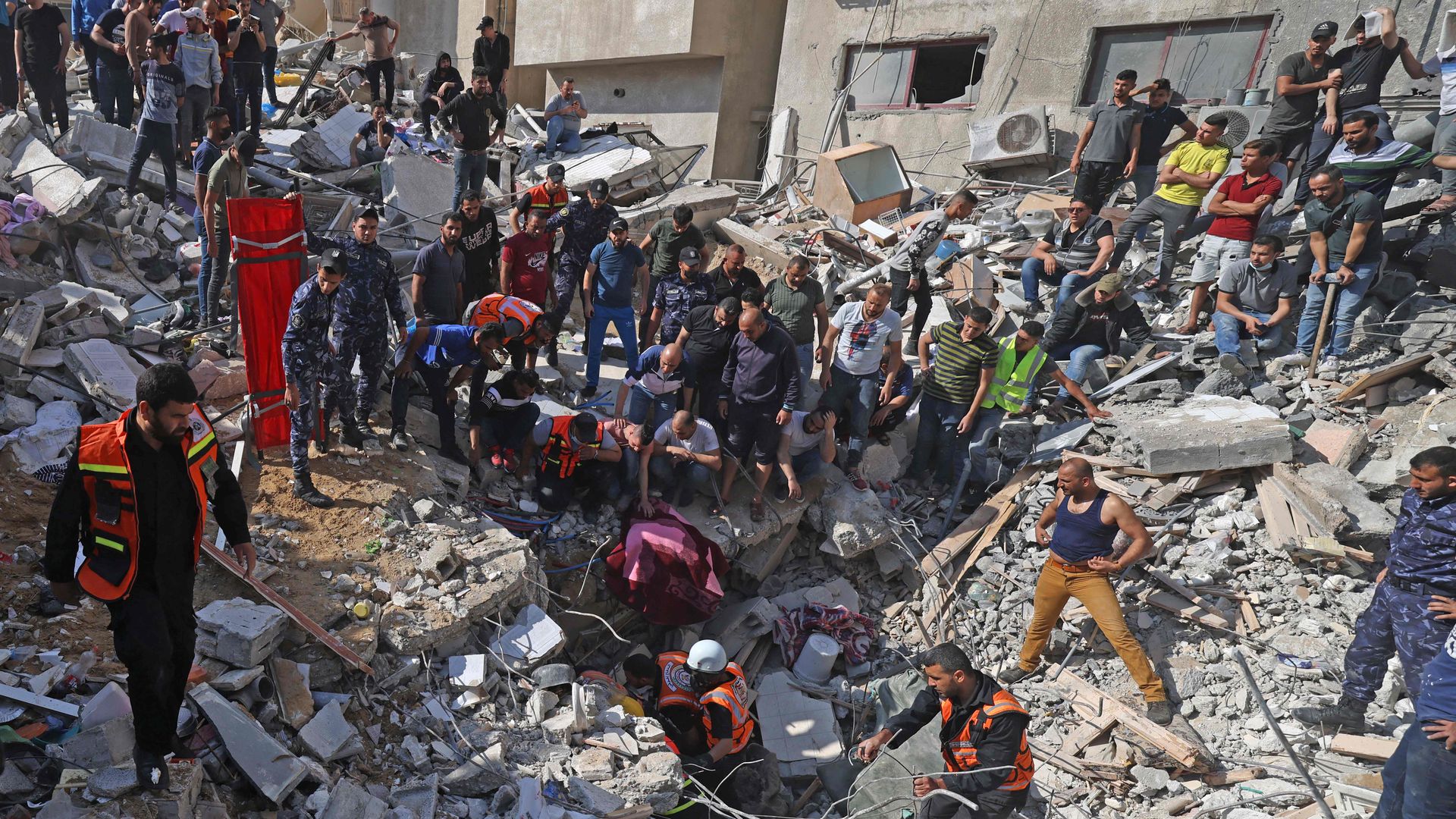 | | | Searching for survivors after a strike in Gaza. Photo: Mahmud Hams/AFP via Getty | | | | President Biden expressed support for a ceasefire between Israel and Hamas in a call on Thursday evening with Israeli Prime Minister Benjamin Netanyahu, the White House said in a statement. Why it matters: This is the first time since the beginning of the crisis last Monday that Biden or anyone in his administration has publicly backed a ceasefire. It will increase pressure on Israel to seek an end to the conflict, which Netanyahu has insisted will continue until Hamas' ability to attack Israel is further degraded. Between the lines: An Israeli official told Axios' Barak Ravid that the Biden administration hadn't given Israel a deadline for reaching a ceasefire but had been stressing on Monday that it was reaching the end of its ability to hold back international pressure on Israel over the Gaza operation. "The overall message was that they support us but want this to end." — Israeli official to Axios - The U.S. has blocked at least three attempts at the UN Security Council to release a statement on the situation in Gaza.
During the call, Biden reiterated his support for Israel's right to defend itself against indiscriminate rocket attacks while encouraging Netanyahu to make every effort to avoid civilian casualties, the White House said. - Gaza health officials say at least 212 Palestinians have been killed over the past week, including 61 children. Most of the casualties are the result of Israeli airstrikes.
- 10 Israelis have been killed, including two children, as Hamas has fired thousands of rockets at Israel — most of which have been intercepted.
What to watch: Netanyahu thanked Biden for his support for Israel's right to self-defense but stressed that he wants to complete all the goals of the Gaza operation, his office said. |     | | | | | | 3. State of the outbreak: Biden to donate more doses |  | | | Illustration: Rae Cook/Axios | | | | 1. President Biden will send an additional 20 million doses of coronavirus vaccines to other countries by the end of June, including shots authorized by the FDA for use in the U.S., White House press secretary Jen Psaki said Monday. - Why it matters: It will be the first time the U.S. has sent Pfizer, Moderna, and/or Johnson & Johnson vaccine doses abroad. The administration previously announced plans to export 60 million doses of AstraZeneca vaccines.
- Between the lines: The U.S. has now pledged to donate more doses than any other country, but will likely have significantly more than 80 million unused doses six weeks from now.
2. Southeast Asia had avoided the worst of the pandemic — until now. - Malaysia, Thailand, Cambodia and Vietnam have all seen their largest spikes to date over the past month and there are worrying signs in Indonesia as well, per the Economist.
- My thought bubble: We've seen vaccine complacency from governments and populations in countries that haven't yet had bad outbreaks, but this is another indication that spikes can still happen anywhere.
3. 90% of Brits have been vaccinated or are willing to be, according to YouGov, the highest among 21 countries or territories polled. - Acceptance rates have ticked up elsewhere too, but lag behind in Thailand (63%), France (60%) and in particular Taiwan (40%) and Hong Kong (37%).
|     | | | | | | A message from Axios | | The podcast to power your day. | | |  | | | | Start your morning with Axios Today. Hear the latest scoops from the White House and Congress, analysis on the economy and insights into trends shaping your world. - In 10 minutes, you'll catch up on today's news that matters.
Listen for free. | | | | | | Bonus: Where in the World? | 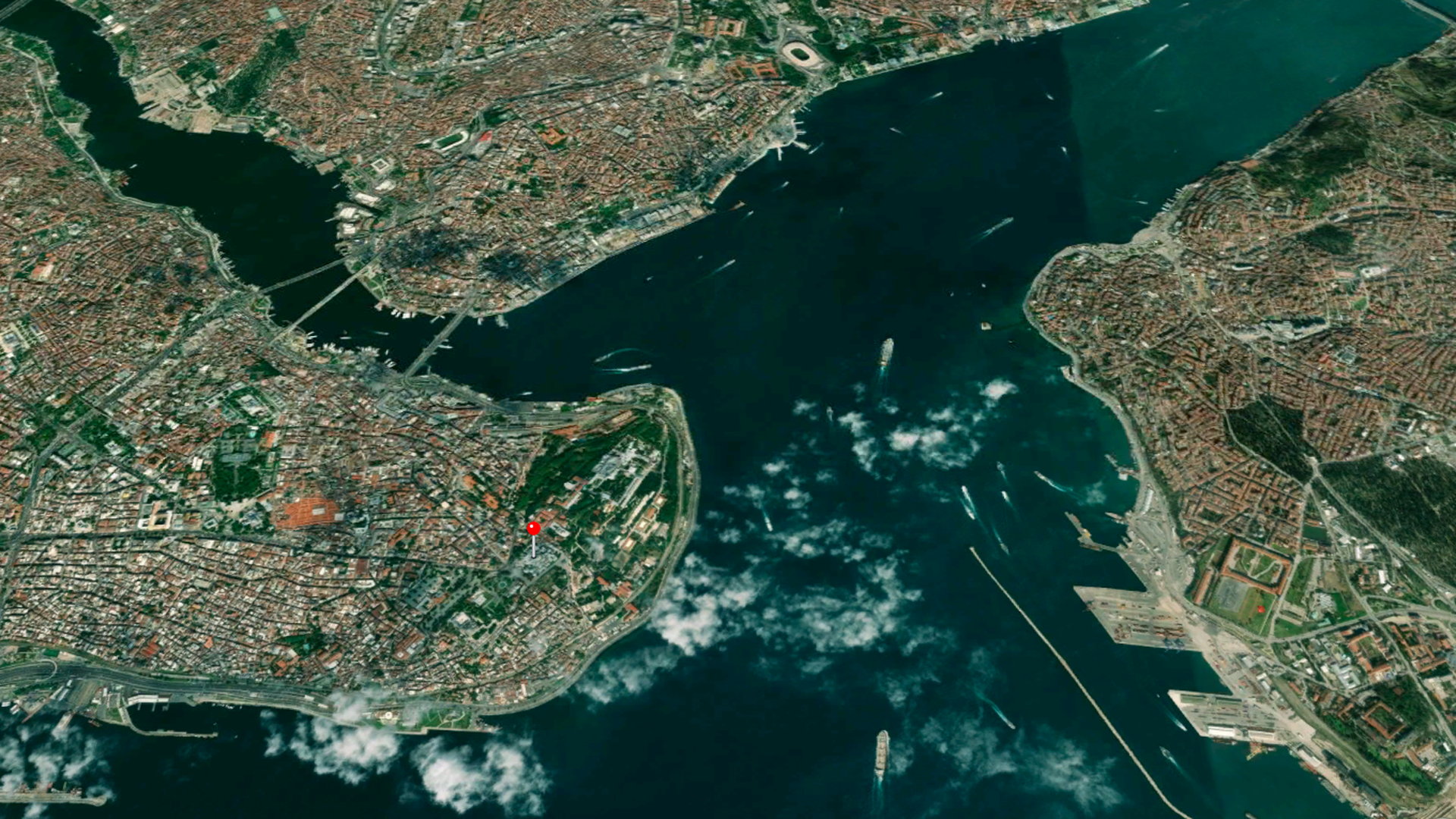 | | | Screengrab via Apple Maps | | | | Name this city that has been renamed twice. For a bonus point, name the place of worship marked by the pin. Scroll to the bottom for the answer. |     | | | | | | 4. Nepal's COVID-19 crisis is as dire as India's |  | | | A cremation site for COVID-19 victims in Kathmandu. Photo: Prakash Mathema/AFP via Getty Images | | | | While India's second wave has alarmed the world, the situation is equally dire across the border in Nepal, which has now surpassed India's per capita death rate, Axios' Erica Pandey writes. Zoom in: Nepal had been relying on India for vaccines, liquid oxygen and other medical supplies, but India cut back on exports to fight its own surge and Nepal is struggling to find other sources. What's happening: The virus is spreading rapidly not just in big cities, but in rural areas that weren't previously exposed to the virus and have limited access to health care. - The test positivity rate is around 30% in Kathmandu, the capital, but as high as 65% in some more remote areas, Prabhat Adhikari, a doctor and infectious disease expert in Kathmandu, tells Axios.
- Many of those dying of COVID-19 in small villages have never had a test or reached a hospital. "We don't even know the actual numbers," says Adhikari.
Nepal's spike was driven in part by the calendar. - April is the peak of Nepal's wedding season, the start of crop planting season and the Nepali New Year. So every April, Nepali migrant workers in the cities, as well as abroad in India and the Middle East, return home to celebrate with their families and help with farm work.
- Says Aseem Bhattarai, another doctor in Kathmandu, "This is the time people always go home, and this time they brought COVID with them."
What to watch: Less than 10% of Nepalis are fully vaccinated and more doses are desperately needed, Adhikari says. - While some doses are flowing in from China while India's supply is paused, Nepal's doctors are looking to the U.S. for help, he says.
|     | | | | | | 5. Must read: Trump vs. the Generals | 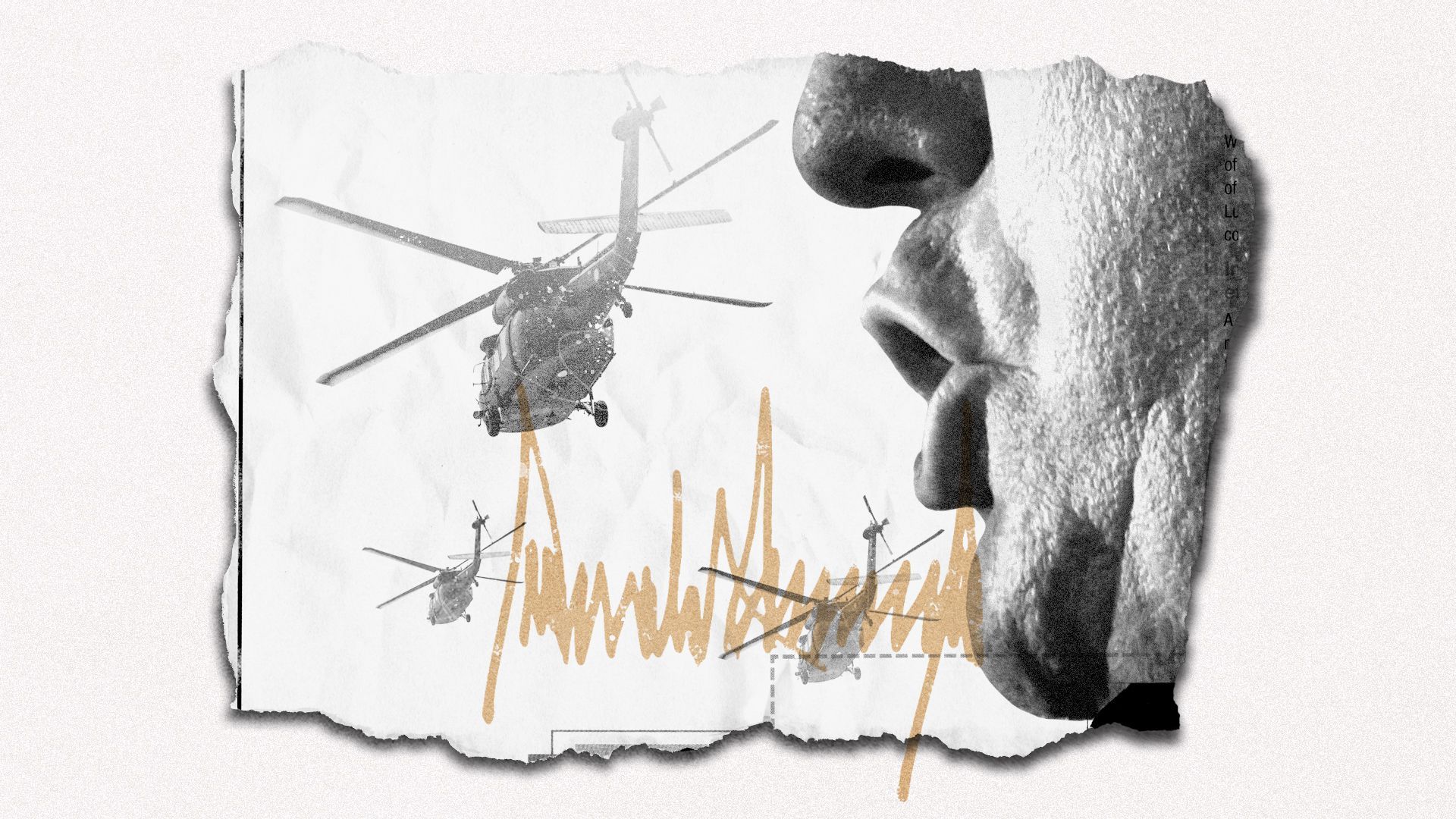 | | | Photo illustration: Sarah Grillo/Axios. Photo: Alex Wong/Getty Images | | | | What happens when a lame duck president gives an order the Pentagon doesn't want to follow? My colleagues Jonathan Swan and Zach Basu explore that question in vivid detail in their final "Off the Rails" installment about Donald Trump's final days. Circumventing the typical channels, Trump issued a one-page memo on Nov. 9, 2020, to Christopher Miller, the newly installed acting defense secretary, ordering all U.S. troops out of Somalia by Dec. 31 and Afghanistan by Jan. 15. He'd originally wanted them out of Iraq, Syria and Germany too. - Top generals and national security officials were blindsided, but they quickly pushed back.
- They eventually got their way, and Trump (who spoke to Axios for the piece) backed down.
- But senior Trump administration officials — some of whom had reviewed classified NSA intercepts in which Joint Chiefs of Staff Chair Gen. Mark Milley was discussed (!) — believed the generals were undercutting civilian control of the military.
Worthy of your time. |     | | | | | | 6. Coming attractions: Blinken to the Arctic | 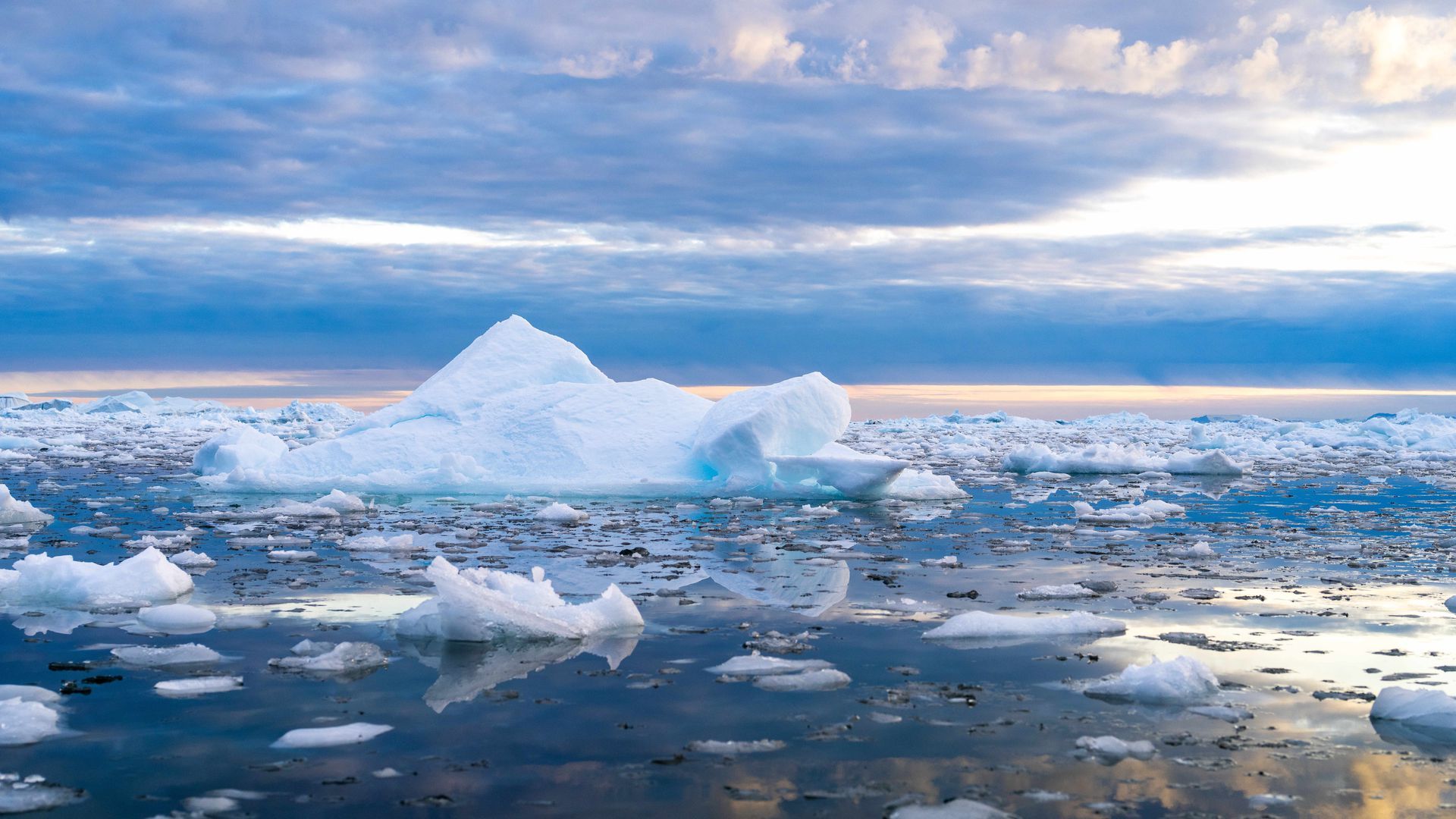 | | | Icebergs near Ilulissat, Greenland. Photo: Ulrik Pedersen/NurPhoto via Getty Images | | | | Secretary of State Tony Blinken is in Denmark today on a Nordic tour that will take him to Greenland and Iceland for an Arctic Council summit. Flashback: Blinken's predecessor, Mike Pompeo, said at a 2019 Arctic Council gathering that the Arctic had become an "arena of global power and competition," particularly with Russia, and that melting ice was opening up new resources and opportunities. - Asked about Pompeo's comments, a senior State Department official said Friday that the developments Pompeo cited were all driven by climate change, later adding, "The opening up of the ocean, if you will, is not an unqualified good thing. It also represents a tremendous risk."
- What to watch: As the Arctic warms further and the region heads for a seasonally ice-free Arctic Ocean by the middle of the century, geopolitical competition is clearly on the increase in the region, Axios' Andrew Freedman notes.
|     | | | | | | 7. Stories we're watching | 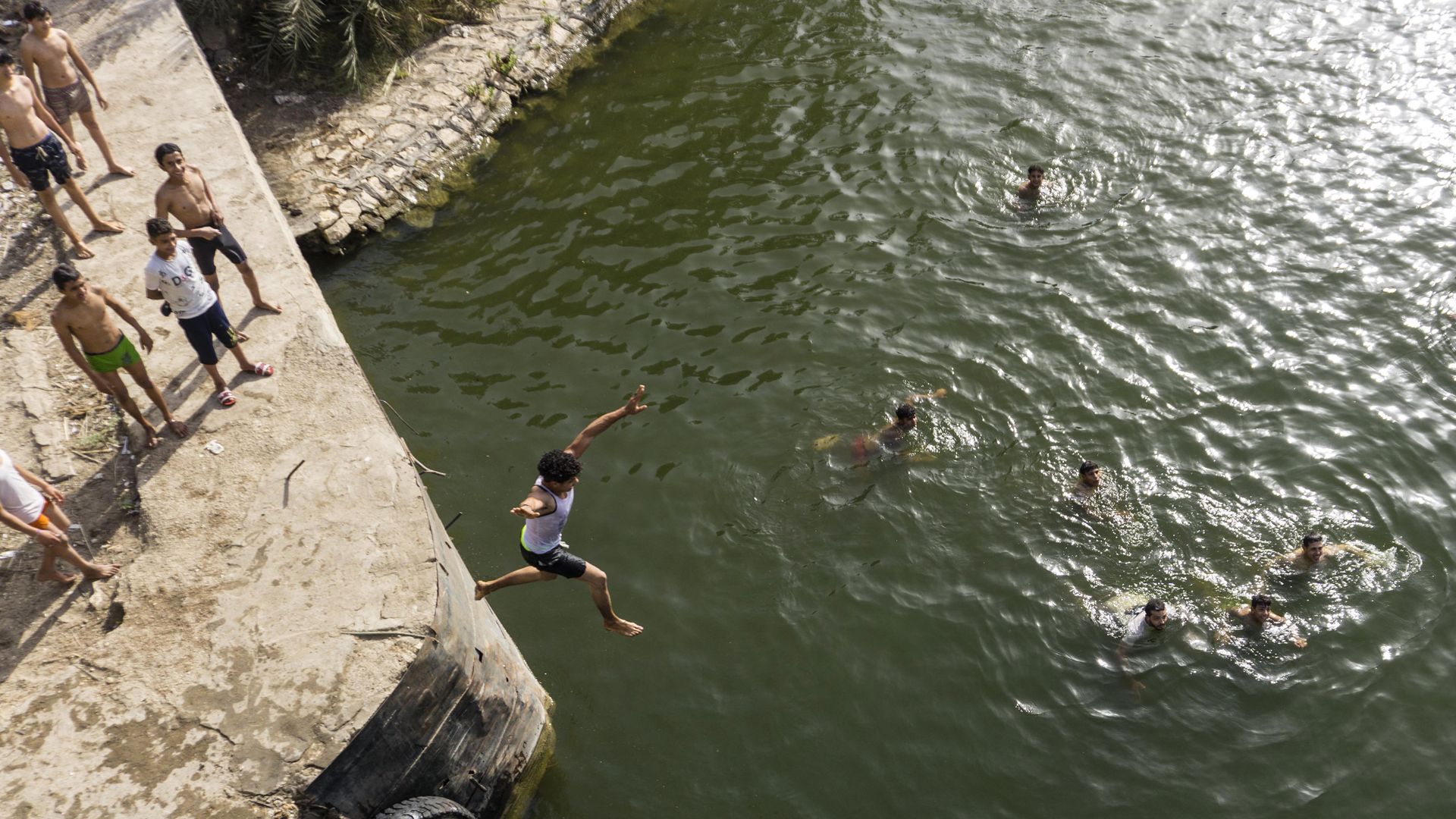 | | | A swim in the Nile, in Qanater el-Khayreya, Egypt. Photo: Khaled Desouki/AFP via Getty | | | - U.S. loses more tax revenue than any nation
- Ireland's health care system targeted by ransomware attack
- China makes history with successful Mars landing
- Activists call for Beijing 2022 boycott
- UN: 10,000 Palestinians displaced
- AP calls for investigation into bombing of Gaza office
- Podcast: Tipping point in Gaza
Quoted: "Regrettably, simply because of the obstruction of one country, the Security Council hasn't been able to speak with one voice." — Chinese Foreign Minister Wang Yi on the U.S. decision to block a statement on Gaza at the UN Security Council. |     | | | | | | A message from Axios | | The podcast to power your day. | | |  | | | | Start your morning with Axios Today. Hear the latest scoops from the White House and Congress, analysis on the economy and insights into trends shaping your world. - In 10 minutes, you'll catch up on today's news that matters.
Listen for free. | | | | Answer: Istanbul (previously Byzantium and Constantinople), home to Hagia Sophia. Correction: In last week's edition, I wrote that Río de la Plata meant River Plate, like the soccer team. The correct translation is River of Silver, but the Anglicized version inspired the name of the team. | | | | Axios thanks our partners for supporting our newsletters.
Sponsorship has no influence on editorial content. Axios, 3100 Clarendon Blvd, Suite 1300, Arlington VA 22201 | | | You received this email because you signed up for newsletters from Axios.
Change your preferences or unsubscribe here. | | | Was this email forwarded to you?
Sign up now to get Axios in your inbox. | | | | Follow Axios on social media:    | | | | | |
No comments:
Post a Comment